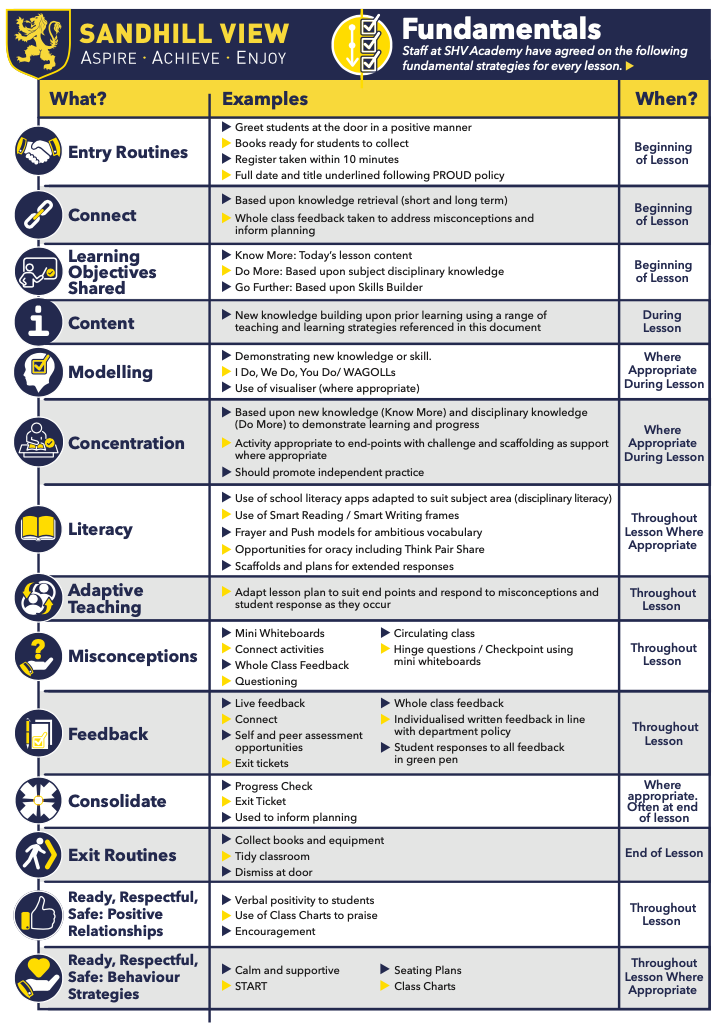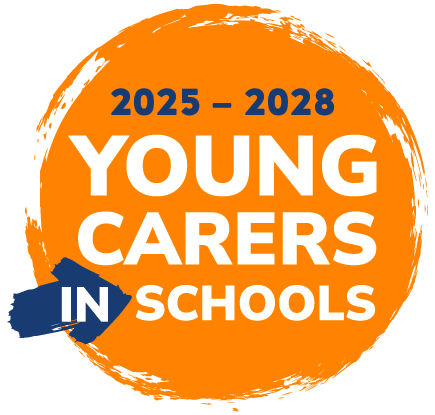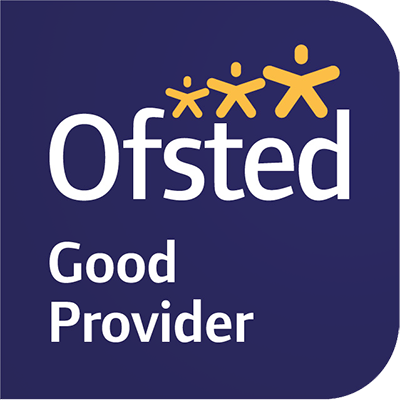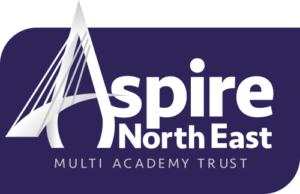Below you will find information on our curriculum for every subject we offer. If you’d like to learn more about the curriculum we follow for a particular subject then please contact the school office.
Aspire North East MAT Curriculum Intent
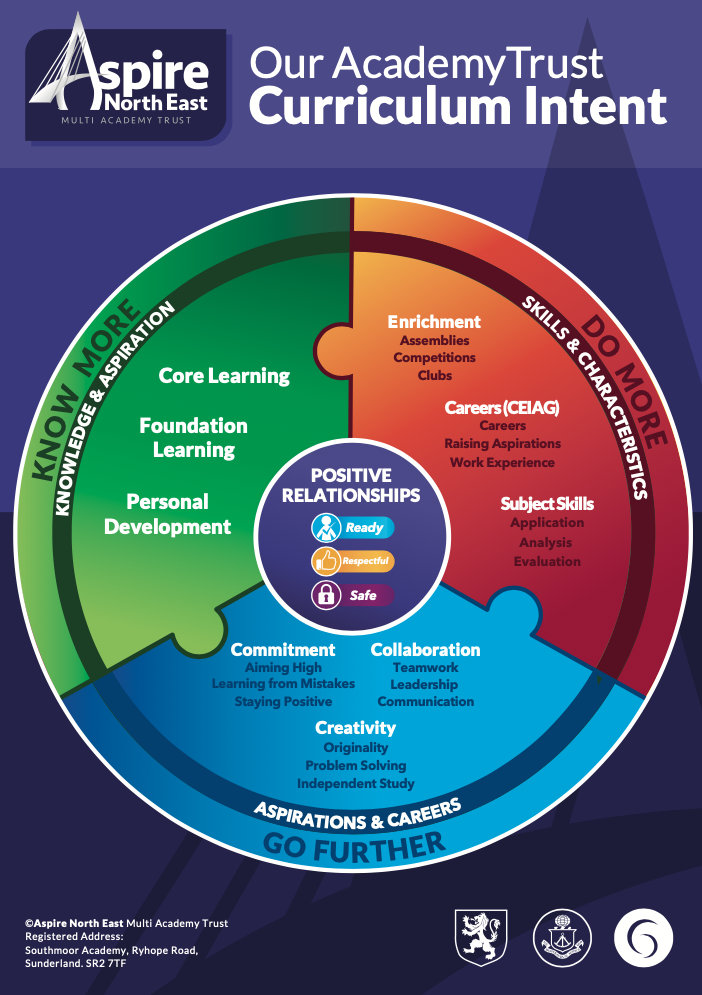
Teaching & Learning at Sandhill View Academy
Teaching & Learning at Sandhill Hill View
At Sandhill View, we are committed to ensuring every child receives quality first teaching every day, in every lesson. As such, our staff use our SHV Fundamentals which are a set of teaching and learning strategies that are embedded into our teaching practice to ensure that every moment matters in every part of the lesson.
What We Are Learning Spring & Summer Terms 2025
Below you will find tables for every year group briefly explaining what they are learning in each subject this half term. You can find much more detail on our curriculum for every subject (Including Knowledge Organisers) by visiting that specific subject’s dedicated page.
You can download the full table of what we are learning for this term below.
• What We Are Learning Spring Term 1 2025
• What We Are Learning Spring Term 2 2025
• What We Are Learning Summer Term 1 2025
• What We Are Learning Summer Term 2 2025
Year 7 Spring 1
Curriculum Area
Year 7: Spring 1
Maths
All students will study probability including working with frequency spaces. In addition all students will study aspects of data including bar charts, scatter graphs and pie charts.
English
‘War Through Language’ – pupils will study and analyse a range of non-fiction and fiction extracts linked by theme of the war. Pupils will also write their own non-fiction texts using the theme of war as a stimulus.
Science
Speed – this topic focuses on calculating and investigating speed of objects and how this can be represented graphically. How do plants reproduce?
Geography
World of Weather Local to global- weather and climate, hostile environments, deserts
History
Development of Church, State and Society 1066-1509 Did Medieval Kings have all the power?
Outdoor Learning
Forest Trails (Biodiversity)-Tree and plant identification, Habitat mapping
MFL
¿Qué estudias? A seven-week module that teaches the students how to talk about school life
Aspire
SMSC: How Can I Express My Identity?
Art
Portraiture: Who is Paper Monster?
Music
Music for Media (Film) with Instruments of the Orchestra
Technology
Food: The Eatwell Guide-How can we eat a balanced diet RM: Tools & Equipment: What different tools are used in a workshop
Sport
Swimming top up. Badminton
Computing
Introduction to Spreadsheets: IT
Year 8 Spring 1
Curriculum Area
Year 8: Spring 1
Maths
Most students will study ration recipes and best buys, four transformations, graphs, speed, time, distance. Some will study coordinates and equations
English
Speeches: Pupils study a range of speeches on a variety of different topics to consolidate/build on their ability to interpret and analyse nonfiction texts.
Science
Respiration. Photosynthesis. Types of Reaction. Chemical Energy.
Geography
World of Work -making connections between rural/urban landscapes and the opportunities offered in these places, linking directly into levels of wealth and economic development.
History
Challenges for Britain, Europe & wider world 1901-present: How did Charlie Buchan go from SAFC to the Somme?
Outdoor Learning
UK Land Use (Location): Exploration of historic land use in Sunderland.
MFL
¿Adónde fuiste de vacaciones? A seven-week module that explores talking about holidays and introduces the past tense.
Aspire
SMSC: What are British Values?
Art
Pop Portraits: Using photoshop and grid drawing to create own Pop painting
Music
Music Through Time & Performance Skills
Technology
Food: Staple foods and food commodities- Where does it come from and how is it made? RM: Practical skills- Apply knowledge of hand tools and machinery to create a mitre and comb joint.
Sport
Badminton, table tennis, swimming stroke development top up
Computing
Turing Lab – Python Programming: CS
Year 9 Spring 1
Curriculum Area
Year 9: Spring 1
Maths
All students will study transformations, ratio and statistics. All will study equations and students in sets 1&2 will study probability.
English
Blood Brothers: Pupils will study the whole play to consolidate/extend their understanding of dramatic conventions.
Science
Fundamental Materials: Atoms. Periodic Table. Reactions.
Geography
World Development: making connections between physical and human features and the impact these can have on the development of a country
History
Through time study: Protest through time Early Modern to Present Day: How have we protested?
Outdoor Learning
Working Woods (Sustainability) Explore the forestry industry within the UK, investigating sustainable wood production and supply in the UK
MFL
¿Qué haces con tu móvil? A seven-week module that builds on prior learning in KS3 to enable students to speak with more fluency about what they lik
Aspire
SMSC: What Does it Mean to be a Global Citizen?
Art
Protest Art: Personal Response
Music
The Blues: American Music & World Music
Technology
Food: Food: Food commodities and labelling What labelling is required on food? Where does our food come from? RM: Perspective Drawing Textiles: Technique samples Carry out a variety of decorative techniques including Batik, block printing and tie-dye.
Sport
Develop individual skills in badminton and table tennis, serving, game play, umpiring Table Tennis, Rugby, Badminton, Fitness
Computing
Python Programming – Chat Bot: CS
Year 10 Spring 1
Curriculum Area
Year 10: Spring 1
Maths
Set 1 & 2 will study transformations, constructions and loci; averages and ranges and symmetry, similarity & congruence. All others will study expanding and simplifying real life graphs
English
Literature: P&C Poetry, Unseen Poetry, A Christmas Carol Language: Writing-Haunting of Hill House- introduction to fiction writing Paper 2 Reading – Nursing – Development of Non-Fiction Reading skills:
Science
Biology 4: Bioenergetics- Respiration and Photosynthesis. Chemistry 4/5: Acids. Alkalis. Reaction profiles, Bond Energies
Geography
Urban Issues and Challenges UK Case study – Sunderland
History
Conflict and Tension: the inter-war years, 1918-1939 Part Two-The League of Nations and international peace
MFL
French: Ma vie scolaire A seven week module that covers studying and future plans Spanish: Mi gente, mi mundo A seven week module that covers People and lifestyle, popular culture, communication and the world around us.
Engineering
R039: Drawing & Development Task 1 Analysis of brief and specification. Freehand sketches. Task 2 design development. Task 3 – orthographic drawing
Hospitality and Catering
Unit 2: 2.3.1 Food safety Unit 1 1.4.1 Food related causes of ill health Unit 1 1.4.2 Symptoms and signs of food induced ill health 2.3.1 How to prepare and make dishes.
Art
Personal Response: independently exploring artists work to create own art
Computing (Digital IT)
Component 2: Collecting, Presenting and Interpreting Data
Child Development
RO58 – Create a safe environment and understand the nutritional needs of children from birth to five years
Sport
Core: Table tennis, Badminton, Fitness . Option: Topic Content area 6: Impact of lifestyle on health and fitness, Topic – Content area 7: Applying health and fitness analysis and setting goals
Media
Film is a powerful medium that shapes culture and influences our pupils’ understanding of the world
Land Based Studies
Unit 202 – Health and Wellbeing of Animals
Aspire
SMSC: How Do I Reduce Risk?
Year 11 Spring 1
Curriculum Area
Year 11: Spring 1
Maths
Sets 1 & 2 will Students will study bearings, vectors, proof, equations of circles, y = mx + c, iterations and loci as well as probability. Other sets will study Pythagoras & trigonometry, graphs, Venn diagrams and percentages. With some students studying functional skill numeracy
English
Pupils will study a bespoke, interleaved determined by mock performance
Science
Chemistry 8: Chemical Analysis. Physics 6: Waves. Biology 7: Ecology
Geography
The Changing Economic World
History
Britain: Health and the People: A revolution in medicine
MFL
French: Speaking exam prep.
Engineering
R038: Final Exam (January)
Hospitality and Catering
Unit 2: 2.2.2 How to plan production. Unit 2: 2.3.2 Présentation techniques. 2.3.1 How to prepare and make dishes.
Art
Externally set assignment (examination preparation)
Photography
Externally set assignment (examination preparation)
Performing Arts
Component 3 – Responding to a brief. Essential Content – C – Apply skills and techniques in a workshop performance
Computing (Digital IT)
Component 3: Effective Digital Working Practices – GCSE Examination January
Child Development
RO57: External exam 10th January 2025Revision for potential resit of exam topics will be dependant on exam analysis and identified misconceptions from the previous exam using ‘Active results’:
Sport
External Exam – 8th January 2025
Media
Television students can develop a critical understanding of media language, narrative, and audience theory.
Aspire
SMSC: How Do I Prepare for Exams?
Year 7 Spring 2
Curriculum Area
Year 7: Spring 2
Maths
All students will study BIDMAS, estimation, conversions, bisectors and congruence. Some students will study similarity and a cross curricular project with ART. Set 1 & 2 will also study index laws and probability rules
English
Continuation od War Through Language, War poetry, selecting quotations, paragraphing, the world of war
Science
Earth’s structure: How are rocks formed? Universe: What is the composition of space? Energy costs and transfers: What does it cost to generate electricity?
Geography
World of Weather: Weather skills builder
History
Development of Church, State and Society 1066-1509 How far was the Black Death a disaster?
Outdoor Learning
Poetree– reflective reading in the forest
MFL
¿Cuántas personas hay en tu familia? : A six-week module that enables students to talk confidently about their family and friends.
Aspire
RE: What does it mean to be a Christian?
Art
Childhood project: How does Sarah Graham create work inspired by memory?
Music
Music for Media (Film) with focus on Leitmotif and Instrumentation impact on music in film.
Technology
Food: Seasonality and the environment RM: Design and Making- drawing skills to make a functioning product Textiles: Decorative techniques- applique, tie-dye and embellishment
Sport
Swimming stroke development, fitness and exercise to music (dance), Rugby
Computing
Past, Present and Future: IT/Digital Literacy Year 8 Spring 2
Curriculum Area
Year 8: Spring 2
Maths
All students will study inequalities, area, perimeter, volume and surface area. Some students will also study equations of circles and percentage change. Set 1 & 2 will also consider surface area of more complex shapes
English
Love and Relationships: Poetry. Structural analysis, embedding structure/extended devices, the World Human Conditions, dramatic performance.
Science
Contact forces: How do different forces affect objects? Pressure: What factors affect pressure in different changes of state?
Geography
Skills Builder: Urban habitats fieldwork
History
Challenges for Britain, Europe & wider world 1901-present: How was WWII a total war?
Outdoor Learning
Spring Awakening: biodiversity and identifying species
MFL
¿Qué haces con tu móvil? : A six-week module that builds on prior learning in Year 7 to enable students to speak with more fluency about what they like to do
Aspire
RE: Is death the end?
Art
What is expressive art? Exploring water colours
Music
Music Through Time & Performance Skills
Technology
Food: Diet related health RM: Practical skills- Follow health and safety protocol to use disc sander and pillar drill Textiles: Making skills- decorative techniques to create textile product
Sport
Swimming stroke development, top-up basketball, fitness testing and dance, rugby
Computing
Turning Lab FarmBot– Python Text Based Programming Year 9 Spring 2
Curriculum Area
Year 9: Spring 2
Maths
All students will study proportion and fractions, decimals and percentages. Some students will study equations and circles. Set 1 & 2 will also study functions
English
Blood Brothers: Pupils will study the whole play to consolidate/extend their understanding of dramatic conventions. Authorial intent, establishing tone and voice, impact of culture and identity.
Science
Fundamental Plants: What are the factors that affect plant tissues and organs?
Geography
Skills Builder: Geographical investigation/fieldwork
History
Significant society or issue in world history: Was the twentieth century ‘America’s century’?
Outdoor Learning
Small Mammal biodiversity investigation
MFL
¿Qué te gusta comer y beber? : A six-week module that builds on learning in KS3 to be able to describe food and drink preferences.
Aspire
RE: What difference does it make to be non-religious?
Art
My Identity: Developing drawing techniques and research tattoo artists
Music
The Blues: American Music & World Music (e.g. Jazz, Rock n Roll)
Technology
Food: Presentation, techniques and type of service RM: Health and Safety in the workshop Textiles: Designing initial ideas- fashion line up
Sport
Individual skills in badminton, table tennis, rules and regulations of badminton, fitness to exercise (dance), Rugby
Computing
Ethics of Computing: Digital literacy/ IT Year 10 Spring 2
Curriculum Area
Year 10: Spring 2
Maths
Set 1 & 2 will study surds; further trigonometry; accuracy and bounds. All other sets will study ratio and proportion, transformations and averages. Some students will study accuracy and bounds, pie charts.
English
Literature: A Christmas Carol, P& C poetry Language: Paper 2 Writing- Nursing-Development of non-fiction. Paper 1: Reading- Rebecca
Science
Homeostasis: How are body conditions controlled by hormones? Revision based upon common misconceptions
Geography
The Living World: Urban issues, making connections between economic status, understanding eco systems
History
Conflict and Tension: the inter-war years, 1918-1939 Part Three- The origins and outbreak of the Second World War
MFL
French: En plein forme -includes giving opinions about dishes, talking about meals and mealtimes, mental health, unhealthy lifestyle choices, improving your life and lifestyle changes. Spanish :Mi estilo de vida -cultural differences, healthy routines, mealtimes and food trends, comparing old and new habits, illness and injuries, making future wellbeing plans
Engineering
R039: Task 4 engineering exploded drawing and rendering. Task 5 CAD assembly drawing including mated components.
Hospitality and Catering
Unit 1: Customer requirements in hospitality and catering Unit 2 2.1.1 Understanding the importance of nutrition, Unit 2 2.1.2 How cooking methods can impact on nutritional value Unit 2 2.3.1 How to prepare and make dishes.
Art
Lora Zombie: Understanding theme and personal choice
Computing (Digital IT)
Data Presentation- how data I presented to make conclusions
Child Development
RO59- Understand the development of a child from one to five years
Sport
Core: Table tennis, Badminton, Fitness . Option: Topic Content area 8- Structure of a health and fitness programme and how to prepare safely
Media
Music Video- conventions, culture, production, audience and advertising
Land Based Studies
Synoptic Assignment: four tasks based on an scenario
Aspire
RE: Peace and Conflict Part 2 Year 11 Spring 2
Curriculum Area
Year 11: Spring 2
Maths
Set 1 & 2 will study circle theorems, fractions, decimals and percentages. All other students will study revision based upon misconceptions from mock exams and in class assessment
English
Pupils will study a bespoke, interleaved curriculum determined by mock performance
Science
Chemistry of the atmosphere: How has the Earth’s atmosphere changed over time and how have humans affected these changes? Using resources: What is the impact of products over their life cycle? Electromagnetism: What are permanent and temporary magnets and the factors that affect the strength of their fields?
Geography
The Changing Economic World: Case study Newcastle Science Park
History
Norman England: Norman Life
MFL
French: Examination preparation based upon gap analysis from mocks and key misconceptions
Engineering
R038: Final Exam (January)
Hospitality and Catering
How cooking methods can impact on nutritional value. Unit 2: 2.4.1 Reviewing of dishes.
Art
Externally set assignment (examination preparation)
Photography
Externally set assignment (examination preparation)
Performing Arts
Component 3 – Responding to a brief D – Evaluate the development process and outcome in response to a brief
Computing (Digital IT)
Component 3: Effective Digital Working Practices – Resist preparation based upon common misconceptions
Child Development
Revision for potential resit of exam topics will be dependant on exam analysis and identified misconceptions from the previous exam using ‘Active results’:
Sport
Revision based upon misconceptions as well as principles of training and how exercise intensity can be determined
Media
Newspapers- critical understanding of media language, news values and role of journalism
Aspire
SMSC: Relationships Year 7 Summer 1
Curriculum Area
Year 7: Summer 1
Maths
Students will study telling time and working with problems. Probability will be studied including sample spaces and venn diagrams. Fractions. Some students will also study plans and elevations. English
Weather and setting Science
Human reproduction. How do animals reproduce? Variation- how does variation occur in humans? Geography
People Everywhere- changes in population in UK and wider world. Making comparison between rural and urban History
Why is the Tudor period known as the ‘religious rollercoaster’? Outdoor Learning
Bushcraft
MFL
Mi ciudad- how to describe towns and cities Aspire
SMSC: How do relationships define me? Art
Observational drawings, paintings and collages inspired by childhood Music
Composition and BandLab- BandLab basics, arrangement and samples Technology
Food: Why do people choose the foods they eat? RM: Design and Making Textiles: Design and making- decorative techniques and hand embroidery stitches Sport
Cricket, athletics Computing
Past, present and future & Scratch programming (Computer Science) Year 8 Summer 1
Curriculum Area
Year 8: Summer 1
Maths
All students will study bisectors and construction of triangles. Some students will also study speed, distance and time. Additionally, work o angles including angles oin parallel lines. English
Love and Relationships: Drama (Shakespeare) Science
What is the structure of DNA? What is the process of evolution? Geography
Geography of Crime History
Challenges for Britain, Europe & wider world 1901-present: How was WWII a total war? Outdoor Learning
Bushcrafts
MFL
A comer- describe food and drink preferences Aspire
SMSC: What are my rights and responsibilities? Art
Who is Loui Jover? Influence of shadows and silhouettes Music
Composition and BandLab-experimenting use of voice Technology
Food: Functions of Ingredients RM: CAD CAM
Textiles: Making skills
Sport
Cricket, athletics Computing
Internet Safety (Digital Literacy) Year 9 Summer 1
Curriculum Area
Year 9: Summer 1
Maths
All students will study perimeter, volume and surface area. Equations and inequalities. Additionally, some students will study functions and probability, and others will study constructions and loci English
Terror Transition- The Gothic (Language Transition) Science
What are the tests for different gases? How does electrolysis separate ionic compounds? Geography
Geographical applications History
Significant society or issue in world history: Was the twentieth century ‘America’s century’?
Outdoor Learning
Small Mammal Investigation (Biodiversity) MFL
¿Qué hacemos? learning how to make plans to go out. Aspire
SMSC: How do we stay safe in a connected world? Art
My Identity: Creating 3D phot sculptures using thread. Work of Maurizio Anzeri Music
Traditional composition methods using notation (MuseScore) Technology
Food: What foods are popular in different countries? RM: Developing practical skills (lap joint, housing and finger joint) Textiles: Making a fully finished garment Sport
Rounders, softball, cricket, athletics Computing
Impact of AI & Cyber Security- Cyber Explorers (Digital Literacy and Computer Science) Year 10 Summer 1
Curriculum Area
Year 10: Summer 1
Maths
Set 1 & 2 will study solving quadratic equations. All other sets will study constructions and loci, compound measures and formulae English
Literature: Revision for mocks, unseen poetry, An Inspector Calls Language: Writing- Rebecca- Development of Fiction Writing Skills. Reading- homelessness-development of non-fiction reading skills Science
What are the factors that affect rates of reaction? Geography
The Living World: Desert Biome History
Britain, Health and the People: Medicine Stays Still- Middle Ages MFL
French: Numero Vacances-holidays, festivals Spanish : A clase- learning about school days in Spanish speaking countries Engineering
Develop practical making skills including health and safety, practical modelling to create CAD/CAM box Hospitality and Catering
Health and safety in hospitality and catering, food safety, how to prepare and make dishes Art
Independent Study- choose a theme which Lora Zombie has explored in her work Computing (Digital IT)
Effective Digital Working Practices Child Development
Understand the development of a child from one to five years Sport
Core: Rounders, softball, cricket . Option: Effects of health and fitness activities on the body Media
Radio-evolution, formats and genres- impact on society Land Based Studies
Application of technology in the Land Based Sector Aspire
SMSC: How do I manage my money? Year 7 Summer 2
Curriculum Area
Year 7: Summer 2
Maths
Perimeter, Area, and Volume. They will then expand and factorise single brackets English
Finalising study of Weather and Setting/ Shakespeare’s Villains Science
Elements – how do we categorise elements based on their properties? Periodic table – the organisation of elements into the periodic table based on their properties. Acids and alkalis – the chemical reactions involving acids and alkalis and their indicators. Electricity – series and parallel circuits and their features Geography
Rocky World- understanding formation of rock types and their characteristics History
Development of Church, State and Society 1509-1745- Should Elizabeth be remembered as ‘Good Queen Bess’? Outdoor Learning
Elements of nature (Biodversity)
MFL
Mis vacaciones– my holidays. Using the past tense to talk about a holiday including what you did and what it was like culminating in a presentation to improve speaking skills. Aspire
RE: Is it challenging being Jewish in Britain? Art
Childhood: Using a range of materials including pastels, coloured pencils, and waercolour paints. Music
Video Game Music: what are the key features that make VGM successful? Can we perform using them?
Beginners guide: Ukulele performanc
Technology
Food: Seasonal foods, Food miles RM: Hand tools- making Textiles: Pattern cutting, hand embroidery Sport
Rounders, Softball & athletics Computing
Components: IT/Computer Science Year 8 Summer 2
Curriculum Area
Year 8: Summer 2
Maths
All students will study Standard form and developing geometr English
Finalising study of Romeo and Juliet/ Relationships Fiction Science
Earth’s resources – how we use resources from the Earth including recycling. Metals and non-metals – reactions of metals and non-metals with different materials. Electromagnets – how magnetism can be induced and the strength of this magnetic field can be changed Geography
Global politics- making connections between government policies and economic development History
Challenges for Britain, Europe & wider world 1901-present- How did WWII change Sunderland? Outdoor Learning
Pigmentree (resilience) Japanese Art of Hapa zome
MFL
¿Qué hacemos? What shall we do? Making plans, arranging to go out, giving excuses, daily routine and clothes. Aspire
RE: Why is there suffering? Art
Expressive Art- pastel printing, digital editing Music
Film Music: what are the key features that make Film successful? Can we compose film music using them?
Beginners guide: Ukulele performance
Technology
Food: Food commodities, Functions of ingredients RM: Assembly of box, finishing techniques Textiles: Decorative techniques, use of the sewing machine Sport
Rounders, softball, athletics Computing
Cyber Security- Cyber Explorers (Computer Science/ Digital Literacy) Year 9 Summer 2
Curriculum Area
Year 9: Summer 2
Maths
All students will be revising for their end of year exam which will be an overview of everything learnt this year. Students will then receive feedback from this test allowing them to make progress in areas of weakness personalised to themself. Gap analysis will be used within the students last week English
Terror Transition to GCSE – Gothic Fiction and Power and Conflict Poetry Science
Fundamentals: Atoms – the arrangement of atoms in solids, liquids, and gases and how density of objects can be calculated. The structure of the atom and the sub-atomic particles including how the model of this has been developed over time. Geography
The UK’s physical landscape using Atlas and OS map skills History
Breadth Study: Significant society or issue in world History- Was the twentieth century ‘America’s century’?
Outdoor Learning
Outdoor Cooking (Teamwork)- Outback Shack Menu MFL
Operación verano– talking about holiday homes and activities, asking for directions and discussing summer camps. Introduction to GCSE Spanish. Aspire
RE: Right, wrong, good and bad. What are my responsibilities? Art
Identity- Incorporating techniques, applying new skills Music
Styles of Music – 60s/70s rock, film and computer music, 90s pop and current pop. Listen, appraise and perform in these styles Technology
Food: World foods, cooking methods RM: Workshop safety, joining techniques Textiles: Surface decoration, fashion drawing Sport
Rounders, softball, cricket, athletics Computing
Spreadsheet skills: IT Year 10 Summer 2
Curriculum Area
Year 10: Summer 2
Maths
Students will have a recap over algebra from the year and also study bearings. Some students will study simultaneous equations and vectors English
Consolidation based on mock exam performance – Language Paper 1 and Literature Paper 1/ Spoken Language component/ Revision of AIC and P&C (interleaved) Science
C6: Rates of reaction – how chemical reactions can be controlled using different factors. P5: Forces – how an objects motion can be affected by the forces acting on it. This includes Newton’s laws and the laws of motion. Geography
Physical and human fieldwork preparation History
Britain- Health and the People: Medicine Stands still/Beginnings of change MFL
French: Numéro vacances- holidays topic (Theme 2 Popular culture/Theme 3 Communication and the World around us) Spanish : ¡A clase! School topic (Theme 1 People and lifestyle) Engineering
Desigh needs, production methods and the manufacturing process. Hospitality and Catering
Food Safety: hazards, record keeping, food related illness Art
Lora Zombie (Artist 3) Applying a range of techniques, use of own reference points, combining styles. Computing (Digital IT)
Effective Digitital working practices Child Development
Health and wellbeing for child development- conception and health reproduction Sport
Core: Rounders, softball, cricket Option: Structure and function of body systems Media
Online, Social and Participatory Media Land Based Studies
Application of technology in the Land Based Sector Aspire
RE: Religion and Life- Science v Religion
Home Work Plan Summer Term 2025
You have one week to complete each ONLINE homework task. All are based upon prior knowledge from topics taught throughout the term. The LRC and homework clubs can be accessed. If you need a paper copy, please see your class teacher.
You can download the full table of our homework plans below.
• Homework Plan Summer Term 1 2025
• Homework Plan Summer Term 2 2025
Year 7 Homework Plan Summer 1
Year 7 Summer 1 HOMEWORK SCHEDULE
You have one week to complete each ONLINE homework task. All are based upon prior knowledge from topics taught. The LRC and homework clubs can be accessed. If you need a paper copy, please see your class teacher.
Monday Tuesday Wednesday Thursday Friday Week 1 28.04.25-02.05.25
Science (Educake)
Outdoor Learning (Microsoft Forms Quiz) English (Microsoft Forms Quiz)
ICT (Microsoft Forms Quiz)
Maths (Mathswatch)
MFL (Blooket)
Week 2 05.05.25-09.05.25
Science (Educake)
Geography (Microsoft Forms Quiz)
History (Microsoft Forms Quiz)
English (Microsoft Forms Quiz)
Art (Microsoft Forms Quiz)
Maths (Mathswatch)
Week 3 12.05.25-16.05.25
Science (Educake)
PE (Microsoft Forms Quiz)
English (Microsoft Forms Quiz)
Technology (Microsoft Forms Quiz)
Maths (Mathswatch)
MFL (Blooket)
Week 4 19.05.25-23.05.25
Science (Educake)
Geography
(Microsoft Forms Quiz)
History (Microsoft Forms Quiz)
English (Microsoft Forms quiz)
Aspire
(Microsoft Forms Quiz)
Music (Microsoft Forms Quiz)
Maths (Mathswatch)
Year 8 Homework Plan Summer 1
Year 8 Summer 1 HOMEWORK SCHEDULE
You have one week to complete each ONLINE homework task. All are based upon prior knowledge from topics taught. The LRC and homework clubs can be accessed. If you need a paper copy, please see your class teacher.
Monday Tuesday Wednesday Thursday Friday Week 1 28.04.25-02.05.25
Science (Educake)
Outdoor Learning (Microsoft Forms Quiz) English (Microsoft Forms Quiz)
ICT (Microsoft Forms Quiz)
Maths (Mathswatch)
MFL (Blooket)
Week 2 05.05.25-09.05.25
Science (Educake)
Geography (Microsoft Forms Quiz)
History (Microsoft Forms Quiz)
English (Microsoft Forms Quiz)
Art (Microsoft Forms Quiz)
Maths (Mathswatch)
Week 3 12.05.25-16.05.25
Science (Educake)
PE (Microsoft Forms Quiz)
English (Microsoft Forms Quiz)
Technology (Microsoft Forms Quiz)
Maths (Mathswatch)
MFL (Blooket)
Week 4 19.05.25-23.05.25
Science (Educake)
Geography
(Microsoft Forms Quiz)
History (Microsoft Forms Quiz)
English (Microsoft Forms quiz)
Aspire
(Microsoft Forms Quiz)
Music (Microsoft Forms Quiz)
Maths (Mathswatch)
Year 9 Homework Plan Summer 1
Year 9 Summer 1 HOMEWORK SCHEDULE
You have one week to complete each ONLINE homework task. All are based upon prior knowledge from topics taught. The LRC and homework clubs can be accessed. If you need a paper copy, please see your class teacher.
Monday Tuesday Wednesday Thursday Friday Week 1 28.04.25-02.05.25
Science (Educake)
Geography
(Microsoft Forms Quiz)
History (Microsoft Forms Quiz)
English (Microsoft Forms Quiz)
Maths (Mathswatch)
ICT (Microsoft Forms Quiz)
Week 2 05.05.25-09.05.25
Science (Educake)
Geography (Microsoft Forms Quiz)
Outdoor Learning (Microsoft Forms Quiz)
English (Microsoft Forms Quiz)
Maths (Mathswatch)
Art (Microsoft Forms Quiz)
MFL
(Blooket)
Week 3 12.05.25-16.05.25
Science (Educake)
Geography
(Microsoft Forms Quiz)
History (Microsoft Forms Quiz)
English (Microsoft Forms Quiz)
Maths (Mathswatch)
Technology (Microsoft Forms Quiz)
Week 4 19.05.25-23.05.25
Science (Educake)
PE (Microsoft Forms)
English (Microsoft Forms quiz)
Aspire
(Microsoft Forms Quiz)
Maths (Mathswatch)
Music (Microsoft Forms)
MFL
(Blooket)
Year 10 Homework Plan Summer 1
Year 10 Summer 1 HOMEWORK SCHEDULE
You have one week to complete each ONLINE homework task. All are based upon prior knowledge from topics taught. The LRC and homework clubs can be accessed. If you need a paper copy, please see your class teacher.
Monday Tuesday Wednesday Thursday Friday Week 1 28.04.25-02.05.25
History Revision French Revision
English revision French Revision
Maths Revision Media Revision
Chemistry Revision Hospitality and Catering Revision
Geography Revision
Spanish Revision Week 2 05.05.25-09.05.25
Physics Revision Maths Revision Spanish Revision
English Revision Sport Revision
Art exam revision/prep Maths (Mathswatch)
MFL
(Blooket)
Week 3 12.05.25-16.05.25
Science (Educake)
History (Microsoft Forms)
Geography
(Microsoft Forms)
English (Microsoft Forms)
Art
(Microsoft Forms)
Technology (Microsoft Forms)
Child Development
(Microsoft Forms)
Maths (Mathswatch)
Week 4 19.05.25-23.05.25
Science (Educake)
Land Based Studies (Microsoft Forms)
Aspire
(Microsoft Forms)
English (Microsoft Forms)
ICT Revision Sport
(Microsoft Forms)
Maths (Mathswatch)
MFL
(Blooket)
Year 7 Homework Plan Summer 2
Year 7 Summer 2 HOMEWORK SCHEDULE
You have one week to complete each ONLINE homework task. All are based upon prior knowledge from topics taught. The LRC and homework clubs can be accessed. If you need a paper copy, please see your class teacher.
Monday Tuesday Wednesday Thursday Friday Week 1 02.06.25-06.06.25
Science (Educake)
Outdoor Learning (Microsoft Forms Quiz) English (Microsoft Forms Quiz)
ICT (Microsoft Forms Quiz)
Maths (Mathswatch)
Week 2 09.06.25-13.06.25
Science (Educake)
Geography
(Microsoft Forms Quiz)
History (Microsoft Forms Quiz)
English (Microsoft Forms Quiz)
Technology (Microsoft Forms Quiz)
Maths (Mathswatch)
MFL
(Blooket)
Week 3 16.06.25-20.06.25
Science (Educake)
Homework Catch up of any overdue English (Microsoft Forms Quiz)
Art (Microsoft Forms Quiz)
Maths (Mathswatch)
Week 4 23.06.25-27.06.25
Science (Educake)
Geography
(Microsoft Forms Quiz)
Aspire (Microsoft Forms Quiz)
English (Microsoft Forms quiz)
Music (Microsoft Forms Quiz)
Maths (Mathswatch)
MFL
(Blooket)
Week 5 30.06.25-04.07.25
Science (Educake)
History (Microsoft Forms Quiz)
English (Microsoft Forms quiz)
Homework Catch up of any overdue Maths (Mathswatch)
Week 6 07.07.25-11.07.25
Science (Educake)
PE (Microsoft Forms Quiz)
English (Microsoft Forms quiz)
Homework Catch up of any overdue Homework Catch up of any overdue Week 7 14.07.25-16.07.25
Homework Catch up of any overdue Homework Catch up of any overdue Homework Catch up of any overdue School Holidays School Holidays Year 8 Homework Plan Summer 2
Year 8 Summer 2 HOMEWORK SCHEDULE
You have one week to complete each ONLINE homework task. All are based upon prior knowledge from topics taught. The LRC and homework clubs can be accessed. If you need a paper copy, please see your class teacher.
Monday Tuesday Wednesday Thursday Friday Week 1 02.06.25-06.06.25
Science (Educake)
Outdoor Learning (Microsoft Forms Quiz) English (Microsoft Forms Quiz)
ICT (Microsoft Forms Quiz)
Maths (Mathswatch)
MFL (Blooket)
Week 2 09.06.25-13.06.25
Science (Educake)
Geography
(Microsoft Forms Quiz)
History (Microsoft Forms Quiz)
English (Microsoft Forms Quiz)
Technology (Microsoft Forms Quiz)
Maths (Mathswatch)
MFL (Blooket)
Week 3 16.06.25-20.06.25
Science (Educake)
Homework Catch up of any overdue English (Microsoft Forms Quiz)
Art (Microsoft Forms Quiz)
Maths (Mathswatch)
Week 4 23.06.25-27.06.25
Science (Educake)
Geography
(Microsoft Forms Quiz)
Aspire (Microsoft Forms Quiz)
English (Microsoft Forms quiz)
Music (Microsoft Forms Quiz)
Maths (Mathswatch)
MFL (Blooket)
Week 5 30.06.25-04.07.25
Science (Educake)
History (Microsoft Forms Quiz)
English (Microsoft Forms Quiz)
Homework Catch up of any overdue Maths (Mathswatch)
Week 6 07.07.25-11.07.25
Science (Educake)
PE (Microsoft Forms Quiz)
English (Microsoft Forms Quiz)
Homework Catch up of any overdue Homework Catch up of any overdue Week 7 14.07.25-16.07.25
Homework Catch up of any overdue Homework Catch up of any overdue Homework Catch up of any overdue School Holidays School Holidays Year 9 Homework Plan Summer 2
Year 9 Summer 2 HOMEWORK SCHEDULE
You have one week to complete each ONLINE homework task. All are based upon prior knowledge from topics taught. The LRC and homework clubs can be accessed. If you need a paper copy, please see your class teacher.
Monday Tuesday Wednesday Thursday Friday Week 1 28.04.25-02.05.25
Science (Educake)
Revision for upcoming class assessments English (Microsoft Forms)
Maths (Mathswatch)
Revision for upcoming class assessments Week 2 05.05.25-09.05.25
Science (Educake)
Revision for upcoming class assessments English (Microsoft Forms)
Maths (Mathswatch)
Revision for upcoming class assessments Week 3 12.05.25-16.05.25
Science (Educake)
Geography
(Microsoft Forms Quiz)
History (Microsoft Forms)
Child Development
(Microsoft Forms)
English (Microsoft Forms)
Technology (Including Engineering, Hospitality and Catering, Textiles.)
ICT
(Microsoft Forms)
Maths
(Mathswatch)
MFL (Blooket)
Week 4 19.05.25-23.05.25
Science (Educake)
Land Based Studies (Microsoft Forms)
English (Microsoft Forms)
Art
(Microsoft Forms)
Maths (Mathswatch)
Homework Catch up of any overdue Week 5 30.06.25-04.07.25
Science (Educake)
Geography
(Microsoft Forms Quiz)
History (Microsoft Forms)
Child Development
(Microsoft Forms)
English (Microsoft Forms)
Sport
(Microsoft Forms)
Technology (Including Engineering, Hospitality and Catering, Textiles.)
Maths
(Mathswatch)
MFL (Blooket)
Week 6 07.07.25-11.07.25
Science (Educake)
Land Based Studies (Microsoft Forms)
Media Studies
(Microsoft Forms)
English (Microsoft Forms)
Art
(Microsoft Forms)
Homework Catch up of any overdue Homework Catch up of any overdue Week 7 14.07.25-16.07.25
Homework Catch up of any overdue Homework Catch up of any overdue Homework Catch up of any overdue School Holidays School Holidays Year 10 Homework Plan Summer 2
Year 10 Summer 2 HOMEWORK SCHEDULE
You have one week to complete each ONLINE homework task. All are based upon prior knowledge from topics taught. The LRC and homework clubs can be accessed. If you need a paper copy, please see your class teacher.
Monday Tuesday Wednesday Thursday Friday Week 1 28.04.25-02.05.25
Science (Educake)
Geography
(Microsoft Forms)
History (Microsoft Forms)
Child Development
(Microsoft Forms)
English (Microsoft Forms)
Sport
(Microsoft Forms)
Technology (Including Engineering, Hospitality and Catering, Textiles)
Maths (Mathswatch)
MFL
(Blooket)
Week 2 05.05.25-09.05.25
Science (Educake)
Land Based Studies (Microsoft Forms)
Media Studies
(Microsoft Forms)
English (Microsoft Forms)
Art
(Microsoft Forms)
Aspire (Microsoft Forms)
Maths (Mathswatch)
Week 3 12.05.25-16.05.25
Science (Educake)
Geography
(Microsoft Forms)
History (Microsoft Forms)
Child Development
(Microsoft Forms)
English (Microsoft Forms)
Sport
(Microsoft Forms)
Technology (Including Engineering, Hospitality and Catering, Textiles)
Maths (Mathswatch)
MFL
(Blooket)
Week 4 19.05.25-23.05.25
Science (Educake)
Land Based Studies (Microsoft Forms)
Media Studies
(Microsoft Forms)
English (Microsoft Forms)
Art
(Microsoft Forms)
Homework Catch up of any overdue Maths (Mathswatch)
Week 5 30.06.25-04.07.25
Science (Educake)
Geography
(Microsoft Forms)
History (Microsoft Forms)
Child Development
(Microsoft Forms)
English (Microsoft Forms)
Sport
(Microsoft Forms)
Technology (Including Engineering, Hospitality and Catering, Textiles)
Maths (Mathswatch)
MFL
(Blooket)
0Week 6 07.07.25-11.07.25
Science (Educake)
Land Based Studies (Microsoft Forms)
Media Studies
(Microsoft Forms)
English (Microsoft Forms)
Art
(Microsoft Forms)
Homework Catch up of any overdue Homework Catch up of any overdue Week 7 14.07.25-16.07.25
Homework Catch up of any overdue Homework Catch up of any overdue Homework Catch up of any overdue School Holidays School Holidays
Computing For All Curriculum Policy
The curriculum includes formal teaching through our timetabled Computing and Digital Information Technology lessons which is documented in our Computing curriculum policy. In compliance with the national curriculum, those pupils who do not opt to study at KS4, are given the opportunity to study computing at sufficient depth to allow them to access higher levels of study. This is achieved through a range of subjects and activities, to make purposeful, and relevant use of technologies.
View the Full Computing For All Curriculum Policy by Clicking HereHere at Sandhill View Academy, we aim to securely equip all of our students for life beyond school as successful, confident, responsible and respectful citizens. We believe that education provides the key to social mobility and our curriculum is designed to build strong foundations in the knowledge, understanding and skills which lead to academic and personal success. We want our students to enjoy the challenges that learning offers. Ultimately, we want students to ‘Know More, Do More and Go Further’
Our aims are underpinned by a culture of high aspirations. Through developing positive relationships, we work towards every individual having a strong belief in their own abilities so that they work hard, build resilience and achieve their best.


